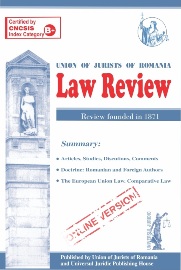LEGAL REGULATION OF THE EXTRADITION IN ROMANIA
LEGAL REGULATION OF THE EXTRADITION IN ROMANIA
Author(s): Petre BuneciSubject(s): Law, Constitution, Jurisprudence, Constitutional Law, Criminal Law, Civil Law
Published by: Universul Juridic
Keywords: extradition; sources of extradition; fundamental principles;
Summary/Abstract: The extradition has as source of regulation the bilateral and multilateral conventions, reciprocity declarations and internal law, the main source of regulation being found primarily in conventions or reciprocity declarations. The international conventions or the treaties represent international agreements concluded between states and governed by the international law; either they are cosigned in a single instrument, either in two or more annexes, irrespective of their particular denomination. These are bi or multilateral acts resulted from the agreement of the states and are governed by the principle „Pacta sunt servanda”, representing the law of the parties which must be executed in good faith. Concretely in Romania, the extradition was regulated as a law institution, in art. 16-19 of the Criminal Code and in the art. 630-638 of the Procedure Criminal Code, Carol II of 1936, the texts mentioned above just consecrating the principles already known of the international penal law. Nowadays, in our country the extradition is regulated by Law no. 302/2004 relating to international judicial cooperation in penal matters amended by Law no. 224/2006, GEO 103/2006 and Law no. 222/ 1 ), this special law clearly stipulating their substantive and formal issues, fixing also the legal framework in the limits of which can be solicited or admitted, its sources of regulation, as well as the order in which they can be used.
Journal: Law Review
- Issue Year: 2011
- Issue No: 01
- Page Range: 66-92
- Page Count: 27
- Language: English
- Content File-PDF

